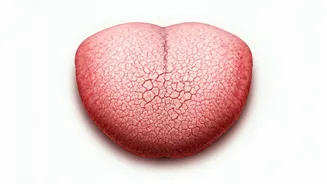Dehydration: The Culprit
Dehydration often emerges as the primary cause behind a persistently dry mouth. When the body lacks sufficient fluids, saliva production significantly
diminishes, which leads to a parched feeling. Numerous factors can induce dehydration, including inadequate water intake, excessive sweating during physical activities or in hot weather, and illnesses accompanied by vomiting or diarrhea. Additionally, certain medications, like diuretics, might also contribute to fluid loss. Addressing this requires a simple solution—increase your fluid intake. Regularly sipping water throughout the day can assist in restoring hydration levels and in alleviating the dryness. This is particularly important for individuals engaged in active pursuits or those exposed to high temperatures, where fluid loss is accelerated.
Autoimmune Disorder's Role
Autoimmune disorders, wherein the immune system mistakenly attacks healthy body tissues, are also linked to dry mouth. Conditions such as Sjögren's syndrome, specifically, frequently involve the destruction of salivary glands. This destruction results in decreased saliva production, causing the mouth to feel dry. Sjögren's syndrome often coexists with other autoimmune disorders, increasing the complexity of diagnosis and management. Recognizing the signs, like persistent dry mouth along with dry eyes, can be a crucial step in seeking medical attention. Treatment typically involves managing symptoms, often with medications to stimulate saliva production or to control the underlying autoimmune response. Regular dental check-ups are also crucial, since dry mouth elevates the risk of dental cavities.
Stress and Anxiety's Influence
Stress and anxiety frequently manifest physically, with dry mouth being a common symptom. During periods of heightened stress, the body releases hormones that can impact saliva production. Moreover, psychological stress can lead individuals to breathe through their mouths, especially at night, exacerbating the drying effect. Furthermore, individuals experiencing anxiety may inadvertently focus on bodily sensations, increasing the awareness of dry mouth and making it feel more pronounced. Managing stress involves various strategies, like practicing relaxation techniques such as deep breathing or meditation. Regular exercise and maintaining a balanced lifestyle can also contribute to reducing overall stress levels, subsequently alleviating the symptom of dry mouth.
Oral Health Problems
Oral health issues can contribute to dry mouth as well. Gum disease or periodontal disease can compromise the oral environment. Infections, such as thrush (oral candidiasis), can affect the mouth and alter the sensation of moisture. Oral infections, if left untreated, can lead to further complications, including difficulty in chewing and swallowing. Maintaining good oral hygiene habits is critical. This involves brushing your teeth at least twice daily, flossing regularly, and undergoing dental check-ups. Moreover, regular dental visits are vital for early detection and treatment of any oral health problems, and thus they aid in managing and preventing dry mouth.
Medication Side Effects
Numerous medications list dry mouth as a common side effect. Antidepressants, antihistamines, blood pressure medications, and various others can decrease saliva production. The degree of dryness often correlates with the specific medication and dosage. If dry mouth is noticed as a side effect, it's essential to consult with a healthcare provider. The provider may adjust the medication or recommend alternative options to alleviate the symptoms. Additionally, certain over-the-counter medications and products may offer temporary relief from dry mouth. These could include artificial saliva substitutes or moisturizing mouthwashes. The use of these products should be guided by a doctor's recommendation.






















